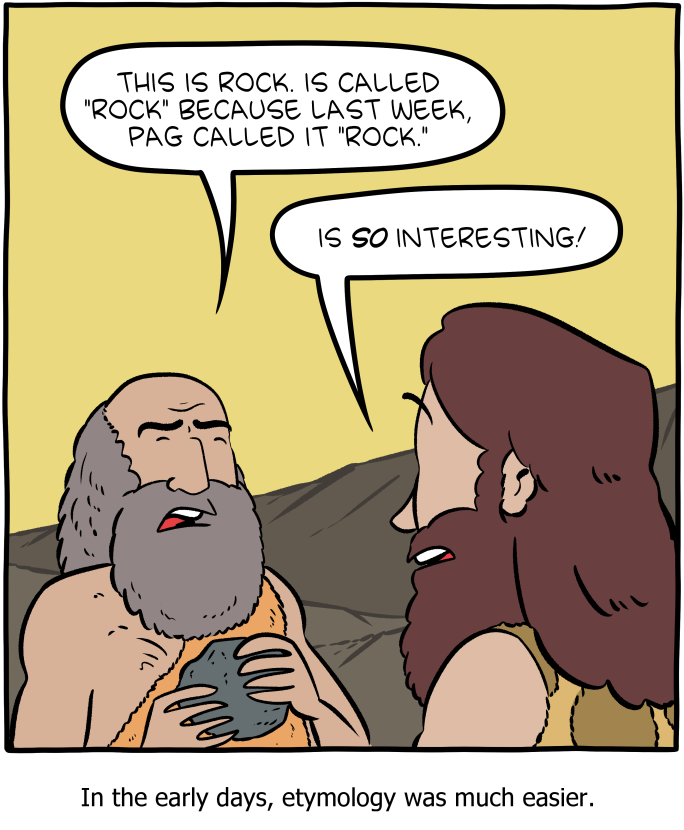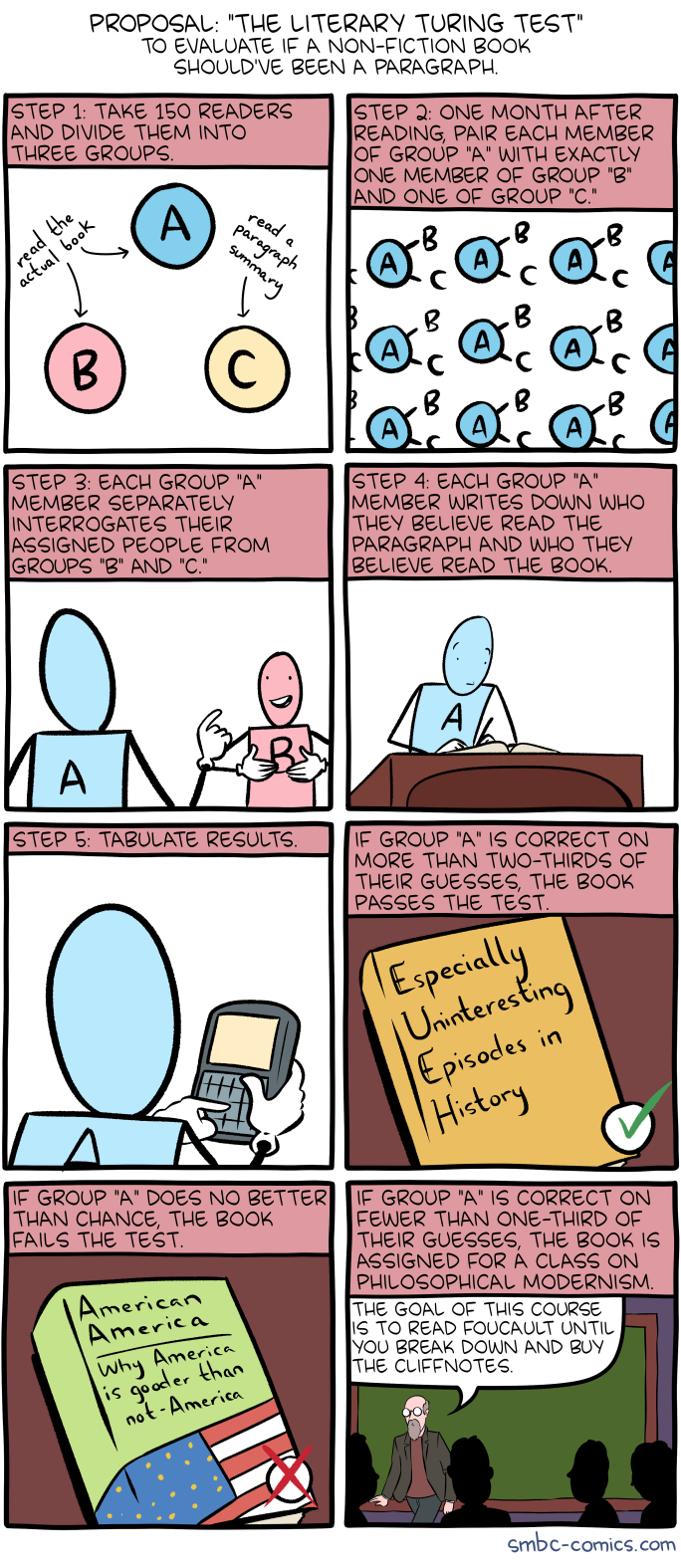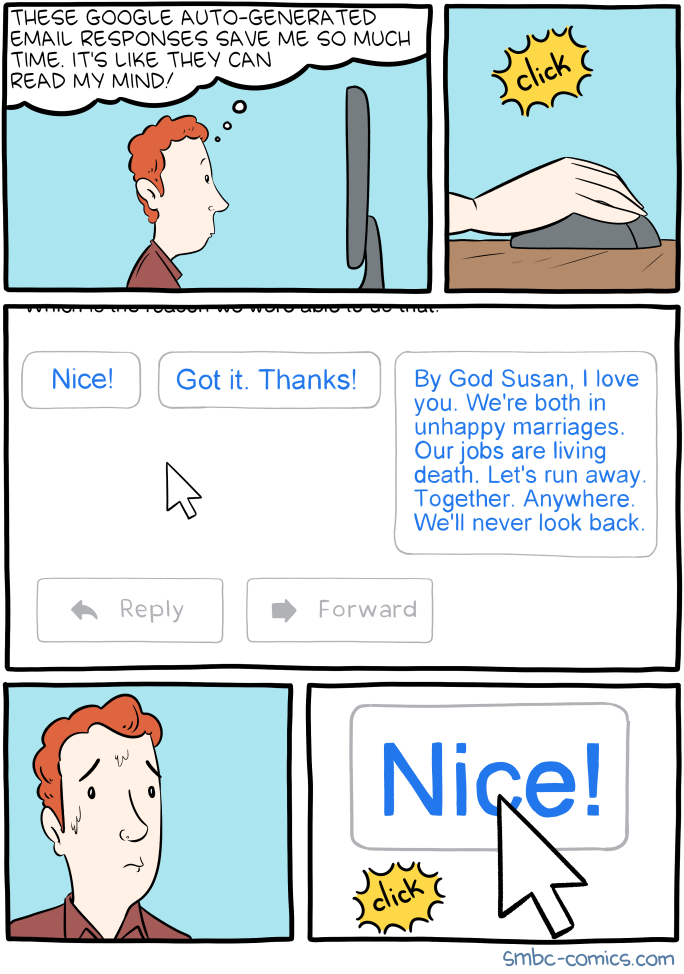Korean refrigerator onomatopoeia
From a tweet by Claire Varley:
https://twitter.com/clairepvarley/status/1061012347270029312
Read the rest of this entry »
Sensitive words: “political background check”
Article by Mandy Zuo in today's (11/9/18) South China Morning Post, "Chinese education officials sorry for announcing Mao-style political background check on students":
Education authorities in southwest China have apologised after they hit a raw nerve by announcing students must pass a “political background check” before they can take the national university entrance exam next year.
Read the rest of this entry »
The dawn of etymology
Yesterday's SMBC:
Mouseover title: "Chicken etymology is really easy because the word origins AND the words you use to describe them are all 'bock bock bock'."
Read the rest of this entry »
Onigiri > Onigilly
Brand-name transliteration (in Embarcadero Center, San Francisco), courtesy of Nancy Friedman:
Read the rest of this entry »
Ethnography of academia
ICYMI — Alexander C. Kafka, "‘Sokal Squared’: Is Huge Publishing Hoax ‘Hilarious and Delightful’ or an Ugly Example of Dishonesty and Bad Faith?", The Chronicle of Higher Education 10/3/2018:
Reactions to an elaborate academic-journal hoax, dubbed "Sokal Squared" by one observer, came fast and furious on Wednesday. Some scholars applauded the hoax for unmasking what they called academe’s leftist, victim-obsessed ideological slant and low publishing standards. Others said it had proved nothing beyond the bad faith and dishonesty of its authors.
Three scholars — Helen Pluckrose, a self-described "exile from the humanities" who studies medieval religious writings about women; James A. Lindsay, an author and mathematician; and Peter Boghossian, an assistant professor of philosophy at Portland State University — spent 10 months writing 20 hoax papers that illustrate and parody what they call "grievance studies," and submitted them to "the best journals in the relevant fields." Of the 20, seven papers were accepted, four were published online, and three were in process when the authors "had to take the project public prematurely and thus stop the study, before it could be properly concluded." A skeptical Wall Street Journal editorial writer, Jillian Kay Melchior, began raising questions about some of the papers over the summer.
Read the rest of this entry »
"The midtowm and midtern year"
At the beginning of Donald Trump's press conference yesterday about the results of the midterm elections, he said something psycholinguistically interesting:
it was a big day yesterday, an incredible day
and last night the republican party defied history
to expand our senate majority
while significantly beating expectations in the house
for the midtowm
and midtern year
Read the rest of this entry »
Writing characters and writing letters
A few days ago, I wrote the following titles on the blackboard in my "Poetry and Prose" class:
Dà Táng Sānzàng qǔjīng shīhuà 大唐三藏取經詩話 (Poetic Tale of Tripitaka of the Great Tang Fetching Scriptures)
Yóuxiān kū 遊仙窟 (The Grotto of Playful Transcendants)
Guānshìyīn yìngyàn jì 觀世音應驗記 (Records of the Verifications of Responses by Avalokiteśvara)
As I was rapidly writing the strokes of the characters — click click click tick tick tack tack click clack tick tack — I suddenly became aware of how different the writing sounded from when I write something in Roman letters. Not only did writing characters sound very different from the way writing letters sounds, the two types of script have a very different kinetic feel to them.
Read the rest of this entry »
"Human parity" in machine translation
In May of 2015, I gave a talk at the Centre Cournot in Paris on the topic "Why Human Language Technology (almost) works", starting with a list of notable successes, including how well Google and Bing on-line translation did on the Centre Cournot's web site. But my theme required a few failures as well, and I found a spectacular set of examples when I tried a chapter-opening from a roman policier that I was reading (Yasmina Khadra, Le Dingue au Bistouri):
Il y a quatre choses que je déteste. Un: qu'on boive dans mon verre. Deux: qu'on se mouche dans un restaurant. Trois: qu'on me pose un lapin.
Google Translate: There are four things I hate. A: we drink in my glass. Two: we will fly in a restaurant. Three: I get asked a rabbit.
Bing Translate: There are four things that I hate. One: that one drink in my glass. Two: what we fly in a restaurant. Three: only asked me a rabbit.
Should be: There are four things I hate. One: that somebody drinks from my glass. Two: that somebody blows their nose in a restaurant. Three: that somebody stands me up.
Read the rest of this entry »
Gender bending in the Sinosphere
Don Clarke has called to my attention a new bilingual, digraphic expression: “娘man结合”. That's "niáng man jiéhé ('woman man [the English word] combination')".
It’s a women’s fashion style that combines femininity in one part of the outfit with manliness in the other — like wearing a colored print dress with an army jacket. Supposedly, “man” is read in the first tone.
Don remarks:
This expression must have the authorities very distressed; not only does it contain foreign words spelled in letters, but it also has the disfavored style "niáng 娘" ("mother; woman; mum; ma; a woman; young girl / woman; young lady; a form of address for an elderly married woman; effeminate [coll.]") . No less than the Xinhua News Agency recently inveighed against the sissified “娘炮”之风 (basically, the Korean boy-band look) as unmanly.
Here’s an account of the controversy (in Chinese).
Read the rest of this entry »
Today's Google Translate poetry
Just checking to see that Google Translate is still into hallucinatory automatic writing…
Today's input is five random hiragana characters — あっぉぉを — repeated various numbers of times:
| あっぉぉを | Oh yeah |
| 2X | I am afraid that |
| 3X | We have an Omote |
| 4X | We will hold an Om to Oh no |
| 5X | We will send out a certain number of employees |
| 6X | We will send out a certain number of employees to a certain number of employees |
| 7X | We will hold a certain number of employees and one million yen |
| 8X | We do not want to be an omen |
| 9X | We will transfer a certain amount of money to a certain number of employees |
| … | … |
| 13X | We did not wish to be a member of the company. Ah |




